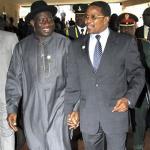27 July 2010

Photo: AP
Nigeria President Goodluck Jonathan, left, walks with Tanzania President Jakaya Kikwete, at the ongoing African Union summit in Kampala, Uganda, 26 Jul 2010
Diplomats often describe the African Union as a "work in progress" - great accomplishment in the midst of poverty, conflict and a distressing record in fostering peace and good governance.
Critics, such as Ugandan lawyer and political commentator Gawaya Tegulle describe the continent's leadership as an "African tragedy."
"If you look at Sudan, Libya, you look at Zimbabwe, it goes without mentioning, Zimbabwe is an obvious case," said Tegulle. "If you look at a series of West African states where you see very weak government, you look at Niger, at the Central African Republic, you look at Chad, these are really depressing stories. So we are looking at a few democrats gathered in Kampala, and a lot of dictators."
Some considered the worst of the continent's leaders are staying away from this summit. Sudan's Omar al-Bashir is among those absent. Uganda, one of 30 African state parties to the International Criminal Court, would have been obliged to arrest the Sudanese leader, who is under ICC indictment for war crimes and genocide.
But even among ICC member states, the Bashir indictment generates anger in an organization known for protecting its own. Malawi's President Bingu Wa Mutharika, who holds the rotating AU chairmanship, received applause when he criticized the ICC indictment.
"There is a general concern in Africa that the issuance of a warrant of arrest for His Excellency al-Bashir, a duly elected president of the Sudan, is a violation of the principles of sovereignty guaranteed under the United Nations and under the African Union charter," said Mutharika. "To subject a sovereign head of state to a warrant of arrest is undermining African solidarity and African peace and security that we fought for for so many years."
This summit is devoted to examining why so many African women die during childbirth. Heads of state participating in a panel discussion on the subject said the biggest challenge is a lack of money. But one panelist, legendary singer Yvonne Chaka Chaka spoke for many Africans when she shot back, "That has not stopped African deposits in Swiss bank accounts."
Activists working on the summit's margins call it 'kleptocracy', the tendency of government officials to divert development funds to their own uses. U.S. Attorney General Eric Holder, in a message from President Barack Obama, announced a new initiative aimed at prosecuting officials who misuse U.S. development aid.
"I am pleased to announce that the U.S. Department of Justice is launching a new Kleptocracy Asset Recovery Initiative aimed at combating large-scale foreign official corruption and recovering public funds for their intended and proper use: for the people of our nations," said Holder.
But for all the failings of its leaders and its institutions, there is no question that Africa is moving forward. The triumph of the World Cup in South Africa is but one example. Speaking at the launch of a new infrastructure initiative, South African President Jacob Zuma predicted Africa's time has come.
"Africa is a region in the world that has started on economic growth and it has potential that no other continent has," said Zuma. "Other continents that have been big for centuries are shrinking in the economic sense. Africa is going to be number one."
This Kampala summit, like every AU gathering, has been dominated by security issues. Somalia tops the list this time.
AU Peace and Security Commissioner Ramtane Lamamra acknowledges the dominance of conflict is an accurate reflection of the state of Africa. But he argues a longer look shows great progress in the past decade, in promoting integration, development and democracy. And, one might add, good governance.